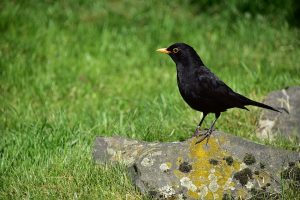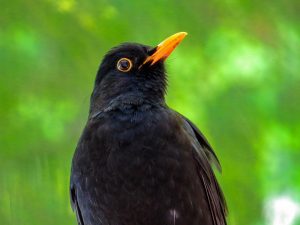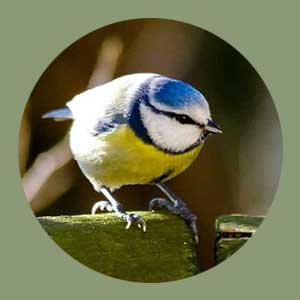My garden seems to be a haven for the local blackbirds; I am often awoken to the sound of them leading the dawn chorus.
When it comes to feeding time, they seem at their happiest pecking in the lawn, borders, and beds. They’re obviously hunting for worms; which made me wonder when there are no earthworms available, what do blackbirds eat?
Blackbirds are omnivores; they eat both plant and animal life.
Their diet is mostly dictated by the seasons; in autumn and winter, they dine on berries, buds, and seeds. During spring and summer, their diet consists mainly of invertebrates and insects. They have a passion for worms, beetles, and caterpillars but also enjoy the occasional spider or moth.
To entice blackbirds into your garden with food, mealworms, porridge oats, and suet are always a good bet.
Table of Contents
What Blackbirds eat in the wild
I love watching blackbirds foraging through the leaf piles and vegetation on the hunt for their favoured earthworms. They have keen eyesight so pick up the slightest hint of a worm from a glimpse at 50-paces! Their hearing is equally impressive – they can hear the worms while they’re underground.

Woodland blackbirds exist mainly on caterpillars in spring and summer; they also make nutritious, easily-digestible food for their chicks.
In autumn and winter, their diet switches to plant matter. These are the seasons that berries are rife; blackbirds particularly enjoy the fruits of the rowan, holly, dog rose, honeysuckle, and ivy.
Feeding garden blackbirds
Blackbirds are predominantly ground feeders so anything you feed them should be scattered on the floor. They don’t mind eating from the bird table but hanging feeders are beyond their skill level – they’re a little ‘portly’ to swing acrobatically!
Mealworms – Live mealworms are the most nutritious and attractive snack for blackbirds, especially during breeding season as they feed them to their chicks.
If you only have dried worms, soak them in warm water to plump them up before feeding them to the birds.
Uncooked oats – They’re easy to sprinkle and a tasty treat.
Suet/fat balls – Pellets, balls, or blocks are ideal during autumn and winter. They have high calorific value; blackbirds store the fat for energy to keep them warm and survive cold nights.
Chopped fruit – Finely chopped seasonal fruits and placed on a flat surface or ground feeder. Just enough for the birds to eat in one session. This prevents rotting food which makes the birds ill.
All berry varieties, grapes, apples, pears, and raisins are a vitamin-packed treat.
Water – Always accompany food with some fresh water. In winter it is especially difficult for blackbirds to find somewhere to rehydrate.
Foods to avoid feeding blackbirds
Many foods are unsafe for blackbirds; some cause illness while others prove fatal.
- Polyunsaturated margarine or vegetable oil – harmful to the insulation properties of the bird and prevent them from keeping warm. They also damage the waterproof coating on the feathers.
- Split peas, lentils, and desiccated coconut – swell when they come into contact with fluid in the stomach, usually resulting in the birds’ death.
- Milk – upsets their delicate stomach linings.
- Dry biscuits – represent a choking hazard.
- Mouldy bread or pastry – cause respiratory tract infections.
- Stale food – food poisoning caused by salmonella.
Do blackbirds eat dog food?
When the summer sun has baked the ground and blackbirds cannot get to any earthworms, meaty dog food is a perfectly acceptable substitute.
It is flavoursome (so I’m told) and contains plenty of protein.
Blackbirds happily feed dog food to their chicks if other food sources are scarce.

Final thoughts
There are many ways of feeding blackbirds without going to too much effort. Considerate planting provides the birds with lots of berries and a habitat for the invertebrates.
A mound of leaves or a pile of rotting logs also attracts insects to entice the birds.
Thanks for taking the time to read ‘What do Blackbirds Eat’.
Good feeding practices encourage birds into our gardens and help them to survive harsh conditions.
